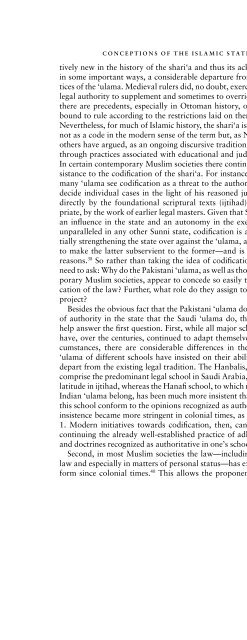Download (1 MB) - Islam and Christian-Muslim Relations: Articles ...
Download (1 MB) - Islam and Christian-Muslim Relations: Articles ...
Download (1 MB) - Islam and Christian-Muslim Relations: Articles ...
Create successful ePaper yourself
Turn your PDF publications into a flip-book with our unique Google optimized e-Paper software.
CONCEPTIONS OF THE ISLAMIC STATE 97tively new in the history of the shari‘a <strong>and</strong> thus its acknowledgement is,in some important ways, a considerable departure from the earlier practicesof the ‘ulama. Medieval rulers did, no doubt, exercise their “secular”legal authority to supplement <strong>and</strong> sometimes to override the shari‘a; <strong>and</strong>there are precedents, especially in Ottoman history, of the judges beingbound to rule according to the restrictions laid on them by the sultans. 36Nevertheless, for much of <strong>Islam</strong>ic history, the shari‘a is better understoodnot as a code in the modern sense of the term but, as Nathan Brown <strong>and</strong>others have argued, as an ongoing discursive tradition articulated in <strong>and</strong>through practices associated with educational <strong>and</strong> judicial institutions. 37In certain contemporary <strong>Muslim</strong> societies there continues to be much resistanceto the codification of the shari‘a. For instance, in Saudi Arabia,many ‘ulama see codification as a threat to the authority of the judge todecide individual cases in the light of his reasoned judgment as guideddirectly by the foundational scriptural texts (ijtihad) or, where appropriate,by the work of earlier legal masters. Given that Saudi ‘ulama enjoyan influence in the state <strong>and</strong> an autonomy in the execution of the lawunparalleled in any other Sunni state, codification is also seen as potentiallystrengthening the state over against the ‘ulama, <strong>and</strong> for threateningto make the latter subservient to the former—<strong>and</strong> is opposed for thesereasons. 38 So rather than taking the idea of codification for granted, weneed to ask: Why do the Pakistani ‘ulama, as well as those in most contemporary<strong>Muslim</strong> societies, appear to concede so easily the need for codificationof the law? Further, what role do they assign to themselves in thisproject?Besides the obvious fact that the Pakistani ‘ulama do not enjoy the sortof authority in the state that the Saudi ‘ulama do, three considerationshelp answer the first question. First, while all major schools of Sunni lawhave, over the centuries, continued to adapt themselves to changing circumstances,there are considerable differences in the degree to which‘ulama of different schools have insisted on their ability or authority todepart from the existing legal tradition. The Hanbalis, for instance, whocomprise the predominant legal school in Saudi Arabia, have allowed vastlatitude in ijtihad, whereas the Hanafi school, to which most Pakistani <strong>and</strong>Indian ‘ulama belong, has been much more insistent that the adherents ofthis school conform to the opinions recognized as authoritative in it. Thisinsistence became more stringent in colonial times, as we saw in chapter1. Modern initiatives towards codification, then, can be thought of ascontinuing the already well-established practice of adhering to the texts<strong>and</strong> doctrines recognized as authoritative in one’s school of law (taqlid). 39Second, in most <strong>Muslim</strong> societies the law—including areas of shari‘alaw <strong>and</strong> especially in matters of personal status—has existed in a codifiedform since colonial times. 40 This allows the proponents of the shari‘a’s



